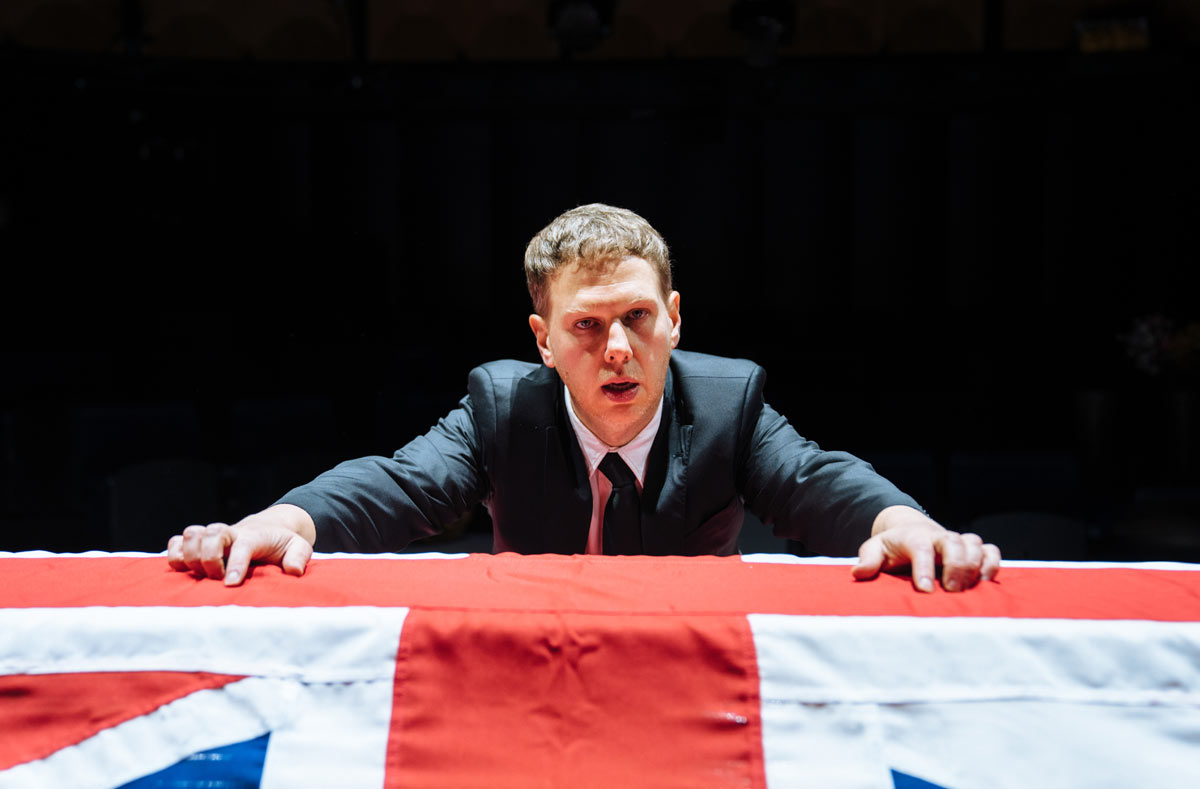Review: DEATH OF ENGLAND: MICHAEL and DELROY at SohoPlace
Perspective, context and environment are everything in this extraordinary trinity of plays presented under the banner DEATH OF ENGLAND, which attempts to encapsulate the state of the nation through the intertwined stories of black and white characters whose lack of genuine understanding of each other’s day-to-day lived experience, becomes startlingly obvious when events unexpectedly ensnare them. The trilogy written and directed by the creative partnership of Clint Dyer and Roy Williams is being presented at SohoPlace, (having previously aired at the National), with the first two instalments MICHAEL and DELROY playing in rep, and the third CLOSING TIME opening at the end of August.
 Thomas Coombes in Death of England: Michael at @sohoplace. Credit Helen Murray.
Thomas Coombes in Death of England: Michael at @sohoplace. Credit Helen Murray.
In the first of these, Thomas Coombes plays Michael, the white working-class, divorced son of Adam, his Leyton Orient supporting florist father. As the England squad succumbs to yet another humiliating penalty shoot-out against Italy, Adam slumps in his chair just as the pub begins to empty-out. Michael’s mother and sister use his father’s death as a catalyst to vent their spleens at his general uselessness, triggering a coffin-side cocaine and alcohol-fuelled eulogy, which quickly degenerates into a slurred and meandering mess, during which Michael loudly proclaims his Dad’s true racist and Nationalist leanings, whilst telling attendees what he really thought of them all. After the ugly and disjointed outpouring at the funeral, an Indian stranger presents Michael with keys and some wholly unexpected revelations.
In perhaps the stronger of the two works, Paapa Essiedu plays Delroy an ambitious bailiff, son to a proud and hard-working Jamaican born mother, and soon to be father. His pregnant girlfriend Carly, is Michael’s sister (and until Adam’s funeral), Delroy was Michael’s best mate. Under a Tory onslaught against the Windrush generation, British society appears to be more eager than ever to adopt racist tropes, never more clearly displayed than when a black player wearing an England shirt, misses a penalty. As Delroy races to the hospital to be with Carly for the birth of his first child, he is deemed to be behaving suspiciously by three police officers and is subsequently arrested for using profane language whilst resisting and protesting his innocence of any wrongdoing. It is an all-too-common story of excessive force deployed by police officers responding to situations where they are unable to rationally justify a tendency to racially profile members of the public.
In each piece, the writers have relied on an individual actor to create all the characters, deliver their conversations, and by means of props ranged around the quartiles of the Cross of St George set, imbue the storytelling with genuinely funny moments, heart rending injustices, pent-up spite and vindictiveness and beautifully rendered, calmly understated acts of empathy.
Much of what is shared, feels like a bang-up-to-date microcosm of frustrated working class London living, with cultural mistrust front and centre. Despite the sinister lingering shadow of Brexit, the tangible feeling of hope which has imbued society as a result of the recent Labour election victory, finds its way into the dialogue. If there were ever a time when audiences would be receptive to suggestions that we need to better listen, hear and understand each other, it is now — and these plays, with their rough and visceral edginess, may just be the vehicles best placed to deliver that message.
Latest News

 Daniel Breaker joins West End production of Hadestown
26 December 2025 at 21:46
Daniel Breaker joins West End production of Hadestown
26 December 2025 at 21:46

 London Productions 2025 - A Year in Review
26 December 2025 at 21:11
London Productions 2025 - A Year in Review
26 December 2025 at 21:11

 Production images released for HIGH NOON
24 December 2025 at 10:54
Production images released for HIGH NOON
24 December 2025 at 10:54

 Full Cast Announced for SHADOWLANDS in the West End
22 December 2025 at 13:14
Full Cast Announced for SHADOWLANDS in the West End
22 December 2025 at 13:14